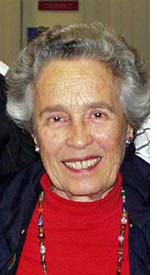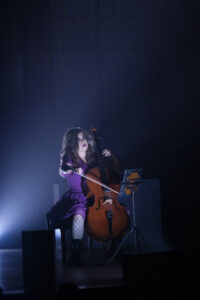
LA JOLLA, California — Entering the Conrad on Thursday evening, November 16, the audience encountered a stage veiled in a white haze. Before the concert was about to begin, the hall went dark. When the lights came on, a spotlighted figure, cellist Alisa Weilerstein, surrounded by the white haze, unleashed an explosion of rapid bow strokes and fast glissandos with diabolical fury.
The opening piece was titled the same as the concert, Fragments II, by Ana Sokolovic, composer-in-residence of the Montreal Symphony. It served as the dramatic opening of an hour-long program of new works interspersed with seven movements from Bach’s Suite #2 for solo cello, one piece segueing into the next, with lighting changes for each and stage sets for the Bach selections. It was not until after the concert was performed that printed programs were distributed, identifying the eighteen pieces programmed.
The Bach selections were a font of beauty, oases of familiarity along the landscape of contemporary music. Weilerstein played the Bach movements with radiant sound and delicate shading, revealing all their glorious grandeur. This listener was happy to learn that she has recently released a recording of Bach’s solo suites for cello on the Pentatone label. It will be a joy to hear them as contiguous pieces.
The selections between the Bach Suites were all new commissions by Weilerstein. Five contemporary composers were represented, including Ana Sokolovic, whose Fragments I and Fragments III were also part of the program along with her opening, Fragments II.
Gity Razaz’s Secrets, the second piece, was filled with lyrical passion, contrasting markedly with what preceded it. Her Invocations were also heard. Razas is on the faculty of the Mannes School of Music in New York and recipient of multiple commissions and prizes.
Caroline Shaw was represented with three selections. One was described, “With one foot heavy and the other light, Johann and Anna lilting across long years.” That piece consisted of two notes in the lower register answered by two notes in the upper register, an interaction representing Johann Sebastian Bach and his second wife, Anna Magdelana. Shaw’s selection before the final Bach Gigue, consisted of beautiful pizzicato chords in familiar progressions, with Weilerstein singing two note and three note phrases. The description, “The late evening held its shape on the edges of the skyline, poised and quivering like a precarious droplet on the back of a ladybug.”
Daniel Kidane was represented by Sarabande I and Sarabande II/III. His music is performed extensively in the United Kingdom. Alan Fletcher, a respected American composer, contributed an Allemande. Fletcher is a faculty member of the New England Conservatory of Music.

Alisa Weilerstein’s impeccable playing from memory for the entire hour was a remarkable feat, rewarded with a spontaneous standing ovation. The lighting and staging added interesting visual dimensions to the concert experience.
The director of the project was Elkhanah Pulitzer, the scenic and lighting designer, Seth Reiser and the artistic producer, Hanako Yamaguchi. Hopefully, this kind of creative presentation will attract more young concert goers to classical music.
This program was part of the California Festival’s Celebration of New Music, a collaboration conceived by conductors Esa-Pekka Salonen of the San Francisco Symphony Orchestra, Gustavo Dudamel of the Los Angeles Philharmonic Orchestra and Raphael Payare, Weilerstein’s husband, conductor of the San Diego Symphony.
Alisa Weilerstein, now mother of two daughters, Ariadna and Elina, comes from a very musical family.
Last August, she soloed in the Elgar Cello Concerto with the Chicago Symphony at the Ravinia Festival under the baton of her celebrated younger brother, conductor Joshua Weilerstein. She is the cellist in the Weilerstein Trio, along with her famous parents, violinist Donald Weilerstein, and pianist Vivian Hornik Weilerstein. The trio is in residence at the New England Conservatory where the senior Weilersteins are on the faculty. Donald Weilerstein is best known as the founder and first violinist of the Grammy-Award winning Cleveland String Quartet. Donald and Vivian also recorded and concertized as the Weilerstein Duo. Their recording of Ernest Bloch’s works for violin and piano won critical acclaim.
Vivian’s music-loving parents came to the United States from Vienna in 1938, to escape the rise of Naziism.
Alisa and Raphael Payare have homes in San Diego and Montreal, where Payare is the newly appointed conductor of the Montreal Symphony. During his tenure in San Diego, we have been privileged to hear many of Alisa Weilerstein’s stellar performances. With the San Diego Symphony, she has played Bloch’s Shelomo, Concertos by Dvorak and Elgar, Strauss’ Don Quixote, and under the La Jolla Music Society, she has been featured in numerous solo and chamber music performances during Summerfest.
We look forward to Fragments III and IV during the coming seasons. Fragments II was not only an unusual concert, but it was a unique multi-sensory experience.
*
Eileen Wingard is a freelance writer specializing in coverage of the arts.
Eileen ~ Your description and praise of this concert make me wish I had accompanied you on this remarkable, dynamic, and innovative journey. Thank you for sharing your impressions so eloquently!